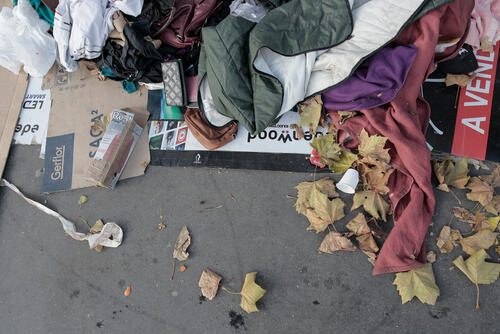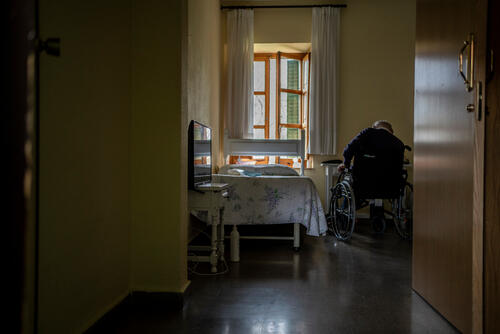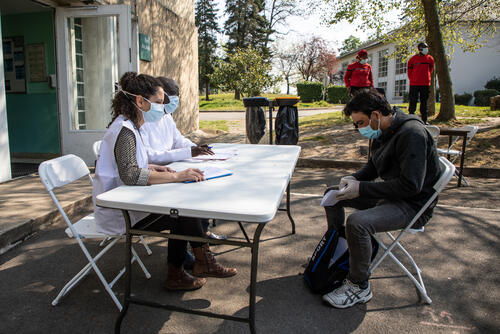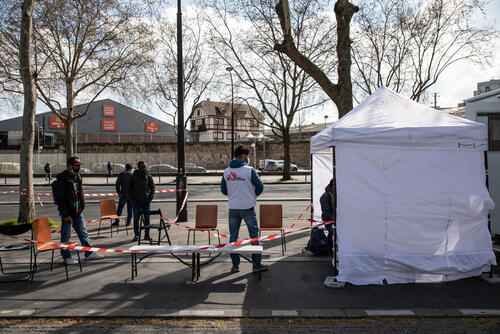- French authorities yesterday evacuated part of the makeshift camp in Porte d’Aubervilliers, north of Paris.
- Many migrants were unable to board buses used during the evacuation and have been left on the streets with nothing.
- Médecins Sans Frontières (MSF) and 22 other organisations are alerting on the lack of sustainable solutions and the persistent violence against migrants in France's capital.
The French authorities yesterday evacuated part of the Porte d'Aubervilliers camp, north of Paris, where more than 2,000 people had been surviving in makeshift tents and shelters along the ring- road. Médecins Sans Frontières (MSF) is regularly on site to offer medical consultations and with 22Action Contre la Faim (ACF), Agir pour le Développement de la Santé des Femmes (ADSF), Amnesty International - Région Paris, La Chorba, La Cimade - Région Ile-de-France, Collectif Audonien Solidarité Migrants, Collectif pour une Nation Refuge, Collectif P’tits Dej Solidaires, Collectif Solidarité Migrants Wilson, Collectif Stalingrad Connection, Le COMEDE, Emmaüs France, Etats Généraux des Migrations Paris (EGM) 75, La Gamelle de Jaurès, Le GISTI, Ligue des Droits de l’Homme (LDH) - Fédération de Paris, Médecins du Monde France (MDM) Médecins Sans Frontières (MSF), Mouvement contre le racisme et pour l'amitié entre les peuples (MRAP) - Fédération de Paris, Paris d’Exil, Paris Refugees Ground Support, Utopia 56, Watizat. other organisations is alerting on the lack of sustainable solutions and the persistent violence against migrants in Paris.
On 6 November, the French government pledged that it would evacuate all the Paris camps before the end of 2019, promising unconditional accommodation for some 3,500 people.
A conditional and undersized response
A first operation took place on 7 November at Porte de la Chapelle in Paris and Wilson Avenue in Saint-Denis, but contrary to the commitments made, the principle of unconditional accommodation was not respected. Within 48 hours, we observed the return to the street of several dozen people, who "did not meet the required administrative criteria". As their tents and sleeping bags were destroyed during the evacuation, those people were left wandering the streets in absolute destitution.
At Porte d'Aubervilliers on 28 November, hundreds of migrants waited in line to board buses provided by the Ile de France Prefecture but were not all able to access them. Only 500 people were evacuated. Among those left behind, some no longer have tents or sleeping bags, which were destroyed during the operation.
The "zero return" policy: the only commitment respected to date
In parallel with these operations, the Police Headquarters announced the implementation of a "zero return" strategy, reinforcing the deployment of police forces to avoid another camp being set up at Porte de la Chapelle and in the other areas concerned. This police harassment that
disperses migrants seems to be the only promise kept so far. It does nothing to resolve the situation of people living on the street, but makes them less visible and isolated.
Migrants are forced to hide and live in unspeakable conditions. This policy does not allow those who wish to apply for asylum to do so under good conditions. It also reduces their access to food distributions, healthcare and information on their rights, and distances them even further from the housing system. We have already observed the ineffectiveness of such police deployment at Porte de la Chapelle in 2017 and at the Millennaire in 2018: it only serves to move the camps to other, less visible, sites.
Endlessly drifting and pushed further out of sight
After 60 evacuations since 2015, we are once again alerting on this endless cycle of confiscation, temporary evacuation and police harassment. Sixty times, unconditional sheltering and sustainable solutions have been promised, yet in the weeks followed, we witnessed the return to the streets of men, women and children who are constantly moved by the police to prevent them from settling anywhere.
Keeping these people in such precarious situations is particularly worrying as winter approaches. The government cannot continue to replicate these evacuation operations without guaranteeing sustained accommodation, access to healthcare and rights for all exiled people in the territory.






